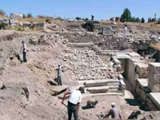|
|
TODAY.AZ / World news
U.S. archeologists find ruins of four ancient castles in Turkey
15 June 2010 [09:45] - TODAY.AZ
A group of American archeologists found ruins of four ancient castles dated back to the 2nd century B.C. in western Turkey.
 The group including 16 students from the universities of Boston, Pennsylvania and Brown led by Assistant Professor of Archaeology Christopher H. Roosevelt has been searching for ancient ruins in Golmarmara town of the western province of Manisa upon permission of the Turkish Ministry of Culture & Tourism.
The group including 16 students from the universities of Boston, Pennsylvania and Brown led by Assistant Professor of Archaeology Christopher H. Roosevelt has been searching for ancient ruins in Golmarmara town of the western province of Manisa upon permission of the Turkish Ministry of Culture & Tourism.In an interview with the A.A on Monday, Roosevelt said that he had directed an archaeological project across central Lydian landscapes for the past five years.
"Our findings indicate that the castle could belong to the Arzawan kingdoms of Seha River Land. We believe that the castles constituted a settlement network. One of them could be the biggest castle built in western Anatolia during the period. The castle is four times bigger than the Troy castle. We may have discovered the capital of the Seha River Land," he said.
Roosevelt said that they were planning to apply to the Turkish Ministry of Culture and Tourism to get permission for archaeological excavations at the site.
As a specialist in the archaeology of western Anatolia (Turkey), specifically that of the ancient kingdom of Lydia, Roosevelt has directed the Central Lydia Archaeological Survey (CLAS), a project that investigates cultural and environmental dynamics across central Lydian landscapes since 2005. He published "The Archaeology of Lydia, From Gyges to Alexander" providing the first overview of the regional archaeology of Lydia in western Turkey. The book includes much previously unpublished evidence and a fresh synthesis of the archaeology of Sardis, the ancient capital of the region.
/World Bulletin/
URL: http://www.today.az/news/regions/69726.html
 Print version
Print version
Views: 2997
Connect with us. Get latest news and updates.
See Also
- 09 September 2025 [23:30]
Ford issues major vehicle recall across US - 09 September 2025 [22:50]
Google AI learns five new languages - 09 September 2025 [21:50]
Nepal PM and president resign as anti-corruption protests over 'nepo kids' escalate - 09 September 2025 [20:50]
Toyota restructures US Lexus production in response to tariff pressures - 09 September 2025 [19:21]
Significant opportunities exist to enhance digital, physical connectivity along Middle Corridor - 09 September 2025 [08:00]
Samsung Display to reveal digital cockpit at German expo - 08 September 2025 [23:30]
The "biggest mystery" of the iPhone 17 revealed - 08 September 2025 [21:41]
Mercedes-Benz misses EU emissions targets - 08 September 2025 [21:23]
Finland preparing new military aid package for Ukraine - 08 September 2025 [20:50]
Oslo removes ATMs to combat drug trafficking
Most Popular
 Baku to host prestigious 2026 SportAccord World Sport & Business Summit
Baku to host prestigious 2026 SportAccord World Sport & Business Summit
 Azerbaijan showcases investment potential at CIFIT 2025 in China
Azerbaijan showcases investment potential at CIFIT 2025 in China
 Russian FSB detains Azerbaijani citizen in Stavropol
Russian FSB detains Azerbaijani citizen in Stavropol
 High level of relations between Azerbaijan and Tajikistan stems from deep respect and trust between our peoples - President Ilham Aliyev
High level of relations between Azerbaijan and Tajikistan stems from deep respect and trust between our peoples - President Ilham Aliyev
 Azerbaijani Foreign Minister meets US Certified Trade Mission on Middle Corridor
Azerbaijani Foreign Minister meets US Certified Trade Mission on Middle Corridor
 Baku trial sheds light on 1988-89 attacks, forced evictions, and killings of Azerbaijanis
Baku trial sheds light on 1988-89 attacks, forced evictions, and killings of Azerbaijanis
 Baku to host 67th General Assembly of International Association of Judges
Baku to host 67th General Assembly of International Association of Judges
